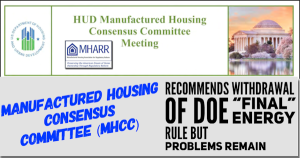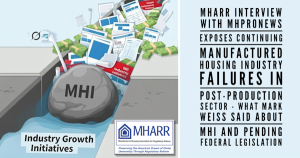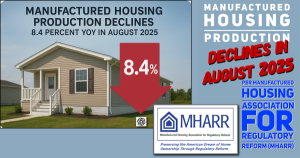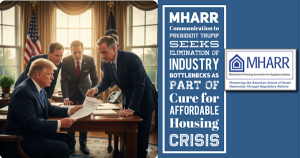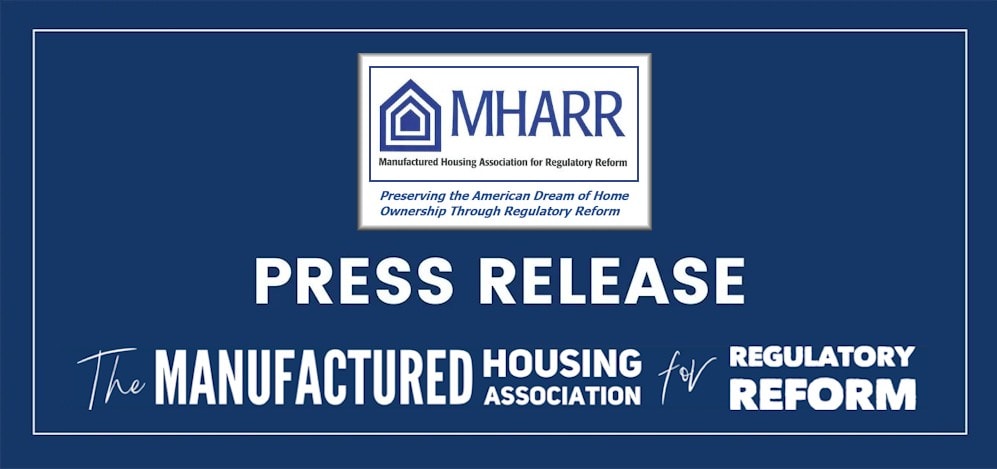
MHARR Issues Proposed Modifications to Pending and Potential Legislation Impacting Manufactured Housing
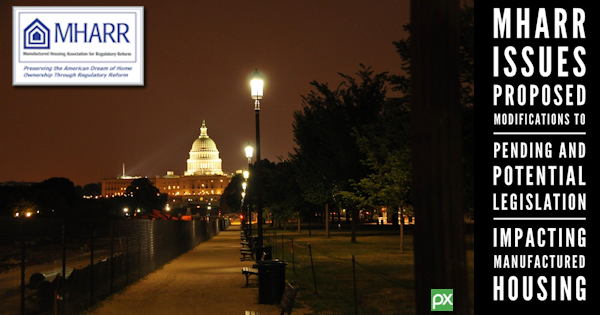
JUNE 11, 2025
IMPORTANT
TO: HUD CODE MANUFACTURED HOUSING INDUSTRY MEMBERS
FROM: MARK WEISS
RE: PENDING AND POTENTIAL LEGISLATION
IMPACTING MANUFACTURED HOUSING
As industry members are aware, the HUD Code manufactured housing industry and American consumers of affordable mainstream manufactured housing are the beneficiaries of two landmark laws enacted with large bipartisan majorities in Congress. These laws, the Manufactured Housing Improvement Act of 2000 (2000 Reform Law) and the Duty to Serve Underserved Markets (DTS) mandate of the Housing and Economic Recovery Act of 2008 (HERA), were designed to herald and advance the full transition of manufactured homes from the “trailers” of yesteryear to full-fledged “housing” for all purposes, and to align federal consumer financing support for manufactured homes with their broader use and acceptance. Those laws cannot and must not be altered in ways that would undermine their fundamental character and essential purposes. However —
(1) The failure by multiple federal actors (including the Department of Housing and Urban Development, the Federal Housing Finance Agency, Fannie Mae and Freddie Mac to implement key provisions of those laws;
(2) The subsequent enactment of baseless unrelated mandates that would undermine the legitimate and necessary purposes of those laws (e.g., the statutory directive for U.S Department of Energy manufactured housing “energy conservation” standards); and
(3) The natural (and inevitable) technological and usage-based evolution of HUD Code manufactured housing —
have led to potential legislation (in multiple bills), currently being considered by Congress, that purport to remedy certain of these issues.
While most of the issues raised by the above-stated three factors (involving primarily the post-production sector of the industry, represented by the Manufactured Housing Institute and not MHARR) should have been examined in congressional oversight hearings and addressed, pursuant to such hearings, with carefully targeted legislation specifically designed and structured to correct and remedy such issues, that has not occurred. Instead (among others), there are currently two draft bills pertaining to manufactured housing pending before the House of Representatives Subcommittee on Housing and Insurance. These are a bill which would give HUD “Primary Authority to Establish Manufactured Home Construction and Safety Standards” and require approval of the HUD Secretary for “Manufactured Home Construction and Safety Standards” issued by other federal agencies (presumably including the DOE manufactured housing “energy” standards), and the “Expansion of Attainable Homeownership Through Manufactured Housing Act of 2025,” which would make the current “permanent chassis” requirement optional, thus allowing manufactured homes to be built with or without a chassis.
Both of these bills, obviously, relate to major issues for both the industry and consumers dealing with the essential nature of HUD Code homes and the uniformity and cost-effectiveness of federal regulation. As such, they will have a significant impact on the industry – and especially its smaller businesses – which are always disproportionately impacted by regulatory actions of any type, as well as lower and moderate-income homebuyers who rely on the inherent affordability of mainstream manufactured homes. As a result, it is essential to ensure that the bills which seek to address such key issues, are not subject to misinterpretation, misapplication, or other misuse by agency actors with goals and objectives that do not necessarily align with those of Congress.
Accordingly, and as previously promised, attached are copies of proposed modifications to both of the above-referenced pending bills, submitted to the Subcommittee by MHARR, to ensure that the proposed bills are as “watertight” and safe from later bureaucratic manipulation as possible. Also included with the proposed modifications are the rationale and justification for each.
We urge you to review these suggested modifications and support them in your interactions with Congress because, without such changes and additions, the current proposed bills could have unintended and/or unforeseen negative consequences for mainstream manufactured housing, manufactured housing consumers and smaller industry businesses in particular.
Please contact MHARR if you have any questions or need any additional information regarding the attached documents. As usual, MHARR will continue to keep you informed as it reviews and submits recommendations to both houses of Congress on all of the multiple pending or potential bills pertaining to or impacting HUD Code manufactured housing.
Thank you.
Mark Weiss
President and CEO
Manufactured Housing Association for Regulatory Reform (MHARR)
1331 Pennsylvania Ave N.W., Suite 512
Washington D.C. 20004
Phone: 202/783-4087
Fax: 202/783-4075
Email: MHARRDG@AOL.COM
Website: www.manufacturedhousingassociation.org

